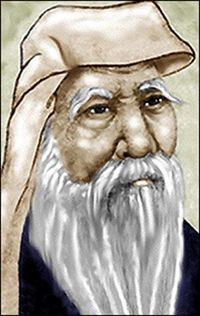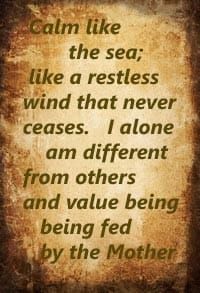The Masters


The Taoist philosophers of ancient China used nature as a way of understanding how rulers and their people could practice the way of 'Heaven.' Buddhism was an offshoot of Hinduism and many of its tenets can actually be traced to Taoism, when it was introduced in China. In the I Ching hexagram (8) Union we see how the (1) Creative/Heaven/Yang and (2) Receptive/Earth/Yin exchange energy in their coming together. Taoism differs from Buddhism in that Taoism does not negate experience; it teaches one to observe the ever changing tapestry without judgment, without embroiling, and with a sense of peace that all is unfolding perfectly. Unlike most philosophies, there is nothing inherently bad in existence so there is nothing to be negated. The Taoist would argue that is not necessarily good either. It is 'just so.'
In the 6th century BC, the Legalists initiated a movement toward reform, and sought to change ritual observances into laws. It is interesting that during the Marxist revolution in 20th century China, a similar reform took place. Like Western Marxism, anything resembling religion or metaphysical awareness was discarded. This is explored more in depth in Chapter Nine of the Mythology of Sleep.
During this period, the most famous of Chinese thinkers, K’ung fu-tzu, known as Confucius, led a group of followers to oppose the Legalist’s efforts, which he believed ignored man’s moral nature.
By twenty-five, Confucius had organized a school and had performed duties in local government where he tested his theories in public office. At some point however, he became an exile. While he is celebrated as a national hero, he died believing he was a failure. Exploring China’s mystical past, he reintroduced the concept of Tao.
Confucius described Tao as the active principle
that was more apparent when people knew their place within society.
Concerned with practical duties and ethics, his ideas would lay the foundation for centuries of practicing civil servants. Like Socrates, he promoted a respect for culture and the pursuit of regular and good behavior. His students sought to realize moral obligations as they applied for official posts. Since rulers were looking for officials who were ethical and could read and write, for more than two thousand years, Confucianism evolved as the powerful ideology of the Chinese state until the Marxist and Communist influences of the twentieth century. In historical terms, China may have kept its independence from other nations because of its Taoist perspective.
Confucius had put man and his behavior central to his philosophy where virtue was primary. He taught: “where there is education, there are no classes,” and education became important in Chinese culture. The ideal virtue required both a virtuous man and a virtuous society. Like the Greeks of the same period, he believed that moral excellence led the Superior Man to become wise, benevolent and courageous. He was known to have carried a well-thumbed copy of the I Ching.
In the fifth century BC, Mo Tzu emerged as a rival to Confucianism, and stressed the importance of universal altruism. Prior to the resurgence of Taoism, Moism and Confucianism dominated Chinese philosophy.
Like Plato who documented the ideas of Socrates,
Chuang Tzu promoted the Taoist teachings of Lao Tzu.
There are many people who have come to the conclusion that Lao Tzu may have been an imaginary figure. The writings within the Tao te Ching are clearly drawn from many philosophers. It does seem that the nature oriented Taoism preceded the other philosophies and Lao Tzu, which means 'old master' may have been created as the embodiment of all of the ancient ancestors. Chuang Tzu presented imaginary dialogues where Lao Tzu opposed Confucius and the humanitarian moralists. Lao Tzu, thought to be a contemporary of Confucius, means Old Master, and he is credited with establishing the philosophical foundation of Taoism. Images of Lao Tzu show him riding a water buffalo. Perhaps this was a symbol for Crossing the Great Water, where perseverance in approaching the unknown strengthened one’s trust in the Way.
Taoism evolved from the teachings of Lao Tzu and Chuang Tzu. The Tao te Ching became a study of the Way to be used by rulers, although Chuang Tzu revealed Tao’s transformative spiritual power and brought its principles to the common people. The cycles of change that he observed at all levels of life, producing the different species he called t’ien chun, or the ‘Evolution of Nature.’ His writings, along with many other 'metaphysical' philosophers were abandoned during the Marxist revolution.
Chuang tzu romanced a transcendental awareness of Tao that went beyond normal perceptual boundaries, and taught that this was a prerequisite for becoming a Sage.
He was often depicted as a rival to Hui Tzu, the great Logician. The conflict between Chuang Tzu’s universality of spirit and Hui Tzu’s logic is dramatized in their many colorful discussions:
As they strolled one day, on the bridge over the river Hao, Chuang Tzu said, “Look how the minnows dart here and there where they will. Such is the pleasure that fish enjoy.”
Hui Tzu replied logically, “You are not a fish. How do you know what gives pleasure to fish?”
Chuang Tzu countered with the same logical perspective, “You are not I. How do you know that I do not know what gives pleasure to fish?”
Hui Tzu stood firm, “Just as I am not you, and cannot know whether you know, then because you are not a fish, you cannot know what gives pleasure to fish. My argument still holds.”
Chuang Tzu was undaunted. “Then let us go back to where we started. You asked me how I knew what gives pleasure to fish. But you already knew how I knew it, when you asked me. You knew that I knew it, because we are standing here on the bridge at Hao.”
Chuang tzu observed life’s fundamental inter-connectivity and where Hui Tzu focused on logical reasoning, Chuang tzu sought a transpersonal awareness. The conversations between them, present a clear example of how the rational mind is at odds with that part of us, which might recognize the harmonious whole and our connection to it. The left brain is believed to be more logical, creating classifications and distinctions, while the right brain processes impressions from a more holistic perspective and is more active during dreaming.
After Hui Tzu’s death, Chuang Tzu lamented, “Since Hui Tzu died, I have had no proper stuff to work upon, have had no one with whom I can really talk.” The opposition arising from their colorful discourse demonstrates how individualistic growth is sharpened by the opportunity presented by contrasting ideas. Conflict always fires the furnace of individuation and innovation.
Our receptivity ensures that our te comes forward to be empowered.
Exerting the will against the world can only disrupt harmony in following the Way. Just as life has a reason for only meeting us halfway, at the threshold of perception, we bring nothing more than our te and our willingness to grow.
The master said: “Silent fulfillment and confidence that needs no words depend upon virtuous conduct. The perfected nature will lead you to the gateway of life.”
You can explore the ancient poetry of Taoism here.
